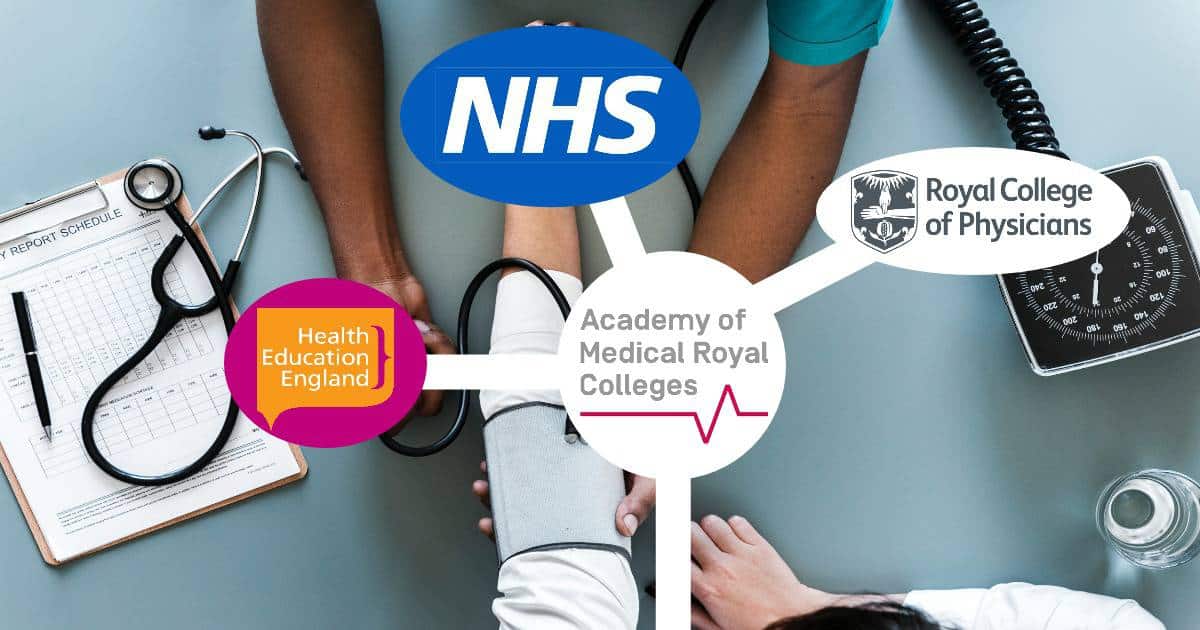Medical Training Initiative (MTI) for IMGs

The Medical Training Initiative (MTI) is a national scheme designed to allow some doctors to enter the UK from overseas for a most of 24 months. This allows them to benefit from training and development in NHS services before returning to their home countries. The scheme is made with the coalition among the Royal Colleges, Trusts, Deaneries, and Academy of Medical Royal Colleges (AoMRC) along with their overseas relationships.
What are the benefits of MTI?
- You are getting the speciality training for 2 years under a qualified NHS consultant and on top of that a postgraduate diploma - Diploma in UK Medical Practice (DipUKMP) will be awarded after the completion if you are sponsored by Royal Colleges. If you are sponsored by your country/third-party, in place of that diploma, you will receive a training completion certificate.
- In addition to receiving up to 24 months of specialised medical training, doctors on the MTI have also can attend a variety of workshops and seminars, gain fellowship to their relevant medical college. In some instances, they can sit their Medical Royal College Part 2/final examination.
- You will be getting a sponsored GMC registration so technically you won't have to go through any hoops of examinations just for GMC registration (like PLAB) before getting into Medical Training Initiative (MTI) in the UK.
- You may also earn the salary of the equivalent doctor in the UK if you're not funded otherwise.
The process of getting into the MTI
Before going into detail whether you are eligible to apply for the Medical Training Initiative in the UK, I want you to understand the complexity of the process. The role of certain organizations need to be clarified first:
General Medical Council (GMC)
They give the doctor full registration with a license to practice on the basis of a GMC approved sponsor. This is the third way a doctor can get registered, with the first being passing the PLAB exams, and the second having an approved postgraduate qualification. Please keep in mind that if anybody tells you that you can practice in the UK without GMC registration, they are lying.
Medical Royal Colleges
They assess the people whether they are eligible for the MTI posts. They also urge the trusts and deaneries to make more Medical Training Initiative (MTI) posts in the UK.
Trusts and Deaneries
They work to find out which posts can be filled with MTI individuals without affecting the UK trainees, and also may help in finding individuals if they have overseas relationships. Trusts are where you actually will be working and trained under the Deanery (now LETBs).
Academy of Medical Royal Colleges (AoMRC)
The Academy works with UKVI to issue a certificate of sponsorship (CoS) which will get you GMC registration and a TIER 5 visa. They are the one pulling all the strings in the Medical training initiative (MTI) scheme in the UK.
I am interested. Am I eligible?
Good question! In February 2018, Health Education of England (HEE) and AoMRC has set new standards for the MTI.
Each Royal College has their own set of entry requirements. For the purpose of discussion Royal College of Physicians, London has been chosen. I would advise you to go through the Royal College website for your choice of speciality. Links are at the end of this post.
Entry Requirements by Royal College of Physicians, London
As for Royal College of Physicians (RCP), criteria for application (ALL must be fulfilled):
- You must hold a primary medical qualification recognised by the GMC and verified by EPIC.
- You need to have a postgraduate qualification (MRCP (UK) part 1, MD, or other higher degree in medicine or a medical subspecialty).
- You must have 3 years of post-qualification experience (including 1 year’s internship and at least 1 year in the speciality where you intend to train whilst in the UK).
- You must have been in clinical practice for 3 out of the last 5 years, including the 12 months prior to GMC registration having being granted. There should be no gaps in employment. Please note that the GMC does not consider clinical observerships as clinical practice. It is important that you remain in clinical practice throughout the application process.
- You must possess the skills, competencies, and understanding of medicine at least equivalent to a UK graduate at the end of their CMT.
- The Royal College of Physicians (RCP) cannot sponsor doctors who have failed the PLAB test.
EPIC verification will also be required to individuals applying for GMC Registration after June 11, 2018. To know more about how to verify your primary medical qualification, please read about ‘EPIC’ for GMC Registration.
Other requirements:
- A valid IELTS/OET.
- You must be able to provide a certificate of good standing (CGS) from the regulatory body in the countries where you have practised in the last 5 years. The CGS must confirm all the following:
- You are authorized to practice medicine in the relevant country.
- You have not at any stage been disqualified, suspended, or prohibited from practising medicine.
- The regulatory authority is not aware of any matters that raise doubts about your good standing.
Keep in mind that the CGS must be no more than 3 months old when it is submitted.
The Application Process for MTI (at RCP, London)
Pros & Cons of MTI UK
Medical Training Initiative (MTI) in the UK is made for “Brain Gain not Brain Drain” — the scheme is made to improve healthcare by training foreign doctors for a period of time. Even though they can't prevent from doctors wishing to settle and continue to work in the UK (with a separate visa and separate employer) after their MTI is over, from royal college's perspective it is discouraged as it defeats the aim of the whole scheme.
Pros of medical training initiative (MTI)
- You aren't required to go through any other exam to complete your Full GMC registration. You are getting it sponsored and it doesn't go away.
- You will be in a training post with a designated Education supervisor (a UK consultant) who will guide you how to get everything done.
- You will be paid as per the pay scale
- You can bring your dependants with you
Cons for medical training initiative (MTI)
- Firstly, MTI posts may not be available for your chosen speciality.
- Your stay in a tier 5 visa will not be counted towards indefinite leave to remain (ILR) or British citizenship.
- If you come via your country's college, you may have other restrictions.
- The process is not pass/fail exam, thus it takes considerable amount of time and a lot of paperwork from various places.
- The overall challenge of settling into a new system without being properly induced can prove to be difficult during initial months.
So, how do I apply for the speciality I want?
Different specialities must be applied for via their respective Royal College. If your speciality does not fall under the list of Medical Royal College below, please contact the MTI team at the Academy at mti@aomrc.org.uk. They will be able to advise you further.
- Royal College of Anaesthetists
- Royal College of Physicians London
- Royal College of Obstetrics and Gynaecologists
- Royal College of Paediatrics and Child Health
- Royal College of Surgeons Edinburgh
- Faculty of Dental Surgery
- Royal College of Emergency Medicine
- Royal College of Pathologists
- Royal College of Ophthalmologists
- Royal College of Radiologists (Oncology)
- Royal College of Radiologists (Radiology)
- Royal College of Physicians and Surgeons Glasgow
- Royal College of Physicians Edinburgh
- ENT UK
- Royal College of Surgeons of England
- Royal College of Psychiatrists
To conclude, if you are looking to move to the UK and make a career as a doctor here, MTI is not for you. This post will not give you any extra advantage over other doctors who worked in the service posts (non-training) in the NHS before applying for core/speciality training. For senior doctors who already have full membership of a royal college, it will be of little benefit for them from the perspective of career progression. For the doctors who are looking for UK experience prior to their part 2/final part of their Royal College Membership, MTI is beneficial.

